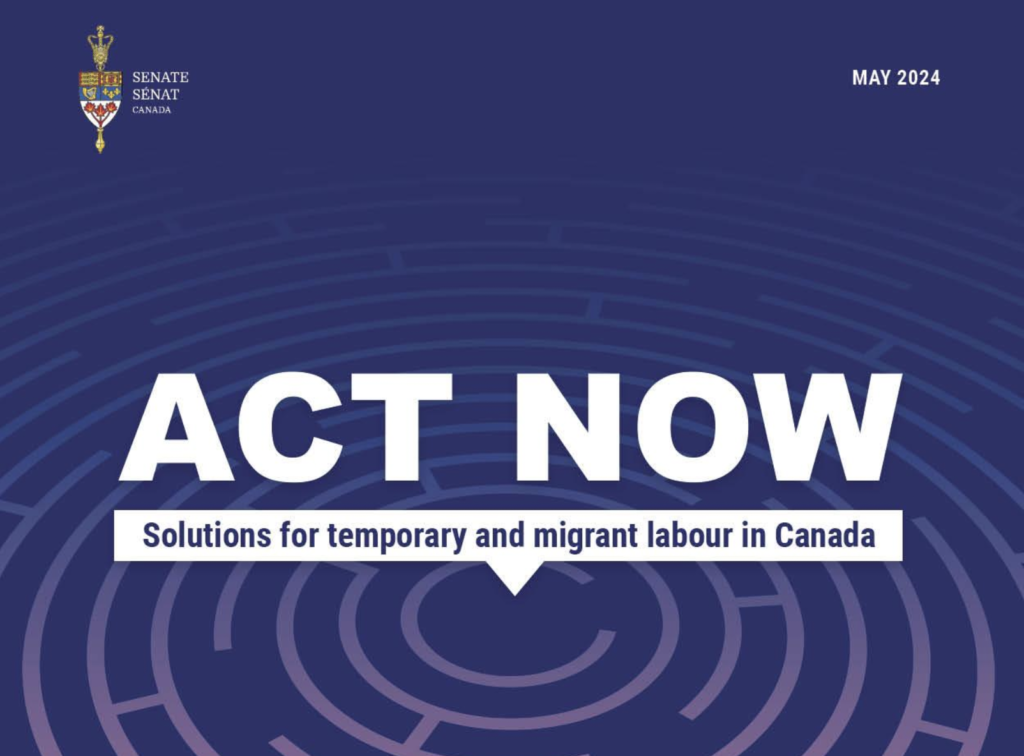Senate report urges federal government to form commission for TFW program

An independent agency is needed to coordinate temporary and migrant labour policy, says a Senate committee report released today.
Read Also


Honey bee health gets funding boost
Ontario’s Honey Bee Health Initiative is getting a funding increase of up to $1 million to help improve the resiliency…
The Standing Senate Committee on Social Affairs, Science and Technology offers six recommendations to the federal government in its Act Now: Solutions for Temporary and Migrant Labour in Canada report. The committee set out to study issues faced by both workers and employers in November 2022.
Why it matters: Finding farm labour is a challenge and so temporary foreign workers have become an important part of doing farm work, from horticulture to the dairy and swine sectors.
The Senate committee said in the report it had a broad mandate that included social and labour matters, immigration and citizenship and health and welfare.
Created in 1973, the Temporary Foreign Worker (TFW) program was formed “as a last and limited resort to allow employers to bring foreign workers to Canada on a temporary basis to fill jobs for which qualified Canadians are not available,” the report said, but has become a “central component of the labour market in Canada.”
At a press conference, committee Chair Senator Ratna Omidvar said the current system falls short of serving anyone, staggering through 50 years of habit and inertia, requiring immediate federal government action to initiate change.
The committee said it welcomed perspectives from witnesses representing workers, employers, sector and industry experts and advocates, academics and government officials over the course of 14 meetings held in Ottawa.
Committee member Senator Rene Cormier of New Brunswick, said Canada’s TFW program is a victim of its own success, driving increased dependency on the program to address labour shortages while failing to develop a corresponding sense of responsibility and gratitude.
“Foreign workers must navigate a compounding bureaucracy to get here, and when they arrive, they lack basic protections that all Canadians enjoy,” he said. At the same time, employers get tangled in bureaucratic battles, leading to the late arrival of their workforce.
“Strong leadership is required to bring order to the chaotic, wasteful and ineffective status quo. We envision a commission that would serve as a one-stop shop for migrants who need help asserting their rights, and for employers seeking support in navigating the labyrinth of red tape and even for government departments seeking to make their operations more efficient,” says Cormier.
Omidvar said migrant labour administration is an “alphabet soup of departments, agencies and organizations sending inspectors and inspections” to enforce various and overlapping compliance and enforcement regimes. She added not one witness could identify a particular organization or body responsible for ensuring standards were met.
Senator Flordeliz (Gigi) Osler, a member of the subcommittee on Agenda and Procedure, said most employers provide safe and fair treatment to migrant workers, but the report shows that unaddressed mistreatment, deception, and threats leave migrant workers uniquely vulnerable. She likened sub-par practices engaged by unscrupulous employers to modernized indentured servitude.
The Act Now report proposes to phase in employer-specific permits with sector or region-specific work permits over three years. This would allow employees to leave abusive situations and give employers the flexibility to deploy workers where needed.
Omidvar said employers and migrant workers that support bad employers with disciplinary action against them have their TFW hiring capacity removed.
“That is not yet the case. Employers who are not up to the standard often are able to demonstrate that they are,” she explained, “and then get back into the mix.”
She believes this is exactly the kind of problem that a Migrant Worker Commission could resolve.
The committee said in the report it would like to see the development of an independent, arms-length tripartite commission to coordinate policy, respond to employers and migrant workers and recommend government policy reforms.
This would include a commissioner for migrant workers, a commissioner for employers and representation from the federal government through Employment and Social Development Canada and Immigration, Refugees and Citizenship Canada.
“No Canadian wants to determine that the product they are consuming is tainted by a labour chain that is exploited in any way,” she said.
Source: Farmtario.com

